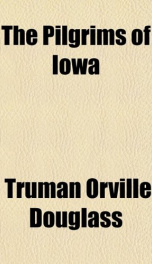the pilgrims of iowa

Purchase of this book includes free trial access to www.million-books.com where you can read more than a million books for free. This is an OCR edition with typos. Excerpt from book: Chapteb III THE PATRIARCHS, 1838-1842 Those named as prospectors, who, up to this time, had simply touched the territory and its embryonic institutions, are Aratus Kent, Cyrus L. Watson, Julius A. Reed, Asa Turner, William Kirby, and William Apthorp. Two of these are now to be classed among the Patriarchs who came to stay, and who above all others, helped to lay permanently and well the foundations of our institutions. The first of the Patriarchs, in time and in effectiveness, is Asa Turner. Of his ancestry, his birth at Templeton, Massachusetts, the incidents of his childhood, his Unitarian associations, his struggles with doubt, his conversion, his experiences as a district school teacher, as a student at Yale College and Divinity School,from the last named of which he graduated in 1829,of his courtship, and marriage and call to the West, etc., etc., there is no occasion to speak at length in this narration, for they may all be found in detail in "Asa Turner and his Times," by Dr. G. F. Magoun. No reader of this book needs to be informed that Mr. Turner was one of the famous Yale Band of Illinois. " One event," says Mr. Turner in his autobiography, "occurred that decided my future life. A band of students was formed for the purpose of going to Illinois and planting the institutions of learning and the gospel. I was invited to join them. I did so. J. M. Ellis, who had been sent by the American Home Missionary Society, was trying to plant an institution in Jacksonville. Correspondence with him led us to unite our efforts with his. The result was Illinois College. This 0. EMERSON J. A. REED ASA TURNER J. C. HOLBROOK R. GAYLORD THE PATRIARCHS West thei: iat theshaped the whole course of my life after. The last year in the Seminary was taken up in this e...
Info about the book
Author:
Series:
Unknown
ISBN:
1117332896
Rating:
2.5/5 (2)Your rating:
0/5
Languge:
English
Users who have this book
Users who want this book
What readers are saying
What do you think? Write your own comment on this book!
write a commentif you like the pilgrims of iowa try:
Other books by this author
Do you want to read a book that interests you? It’s EASY!
Create an account and send a request for reading to other users on the Webpage of the book!

